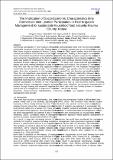The Implication of Socio-Economic Characteristics of the Farmers on their Level of Participation in Rice Irrigation Management for sustainable household food security in Kisumu County, Kenya

View/
Publication Date
2016Author
Margaret Awuor Mitema, Felix Ngunzo Kioli2 Dr Benson Ojwang
Metadata
Show full item recordAbstract/
Community participation in rice irrigation management as acknowledged world over has the potential to boost
sustainable household food security. Despite the transfer of irrigation management to rice farmers in Ahero and
West Kano irrigation schemes in Kisumu County, Kenya since 2004, recent studies show that there is very
minimal participation of the farmers in rice irrigation management, leading to less impact on rice production
hence inconsistent household food availability. Consequently, this study sought to examine the implications of
socio-economic characteristics of the farmers and their level of participation in rice irrigation management. The
study was guided by Participation theory by Arstein (1969) which portrays desired change as something that
actualized through collective actions of all participants. The study used cross-sectional descriptive research
design and mixed method paradigm for data collection methods and analysis. Out of seven (7) variables tested,
only farm size did not have any significant influence on participation in rice irrigation management for
sustainable household food security. The other six (6) variables, age, gender, level of education, residential
status, farm size, experience in rice farming and income earned from rice farming had significant influence.
Thus, the null hypothesis was rejected and alternative, "There is significant relationship between the socioeconomic characteristics of the farmers and level of participation" accepted. However, all variables except
experience in rice farming, had negative influence on participation in rice irrigation management for sustainable
household food security in Ahero and West Kano rice irrigation schemes. The study concluded that there was the
minimal participation of farmers in rice irrigation management due to socio-economic factors including
inadequate farmers' management capacity among others. The study, therefore, recommends empowerment of
farmers through training and review of irrigation Act to allow both male and female farmers to have more
control over rice management to improve on rice production, hence food security
